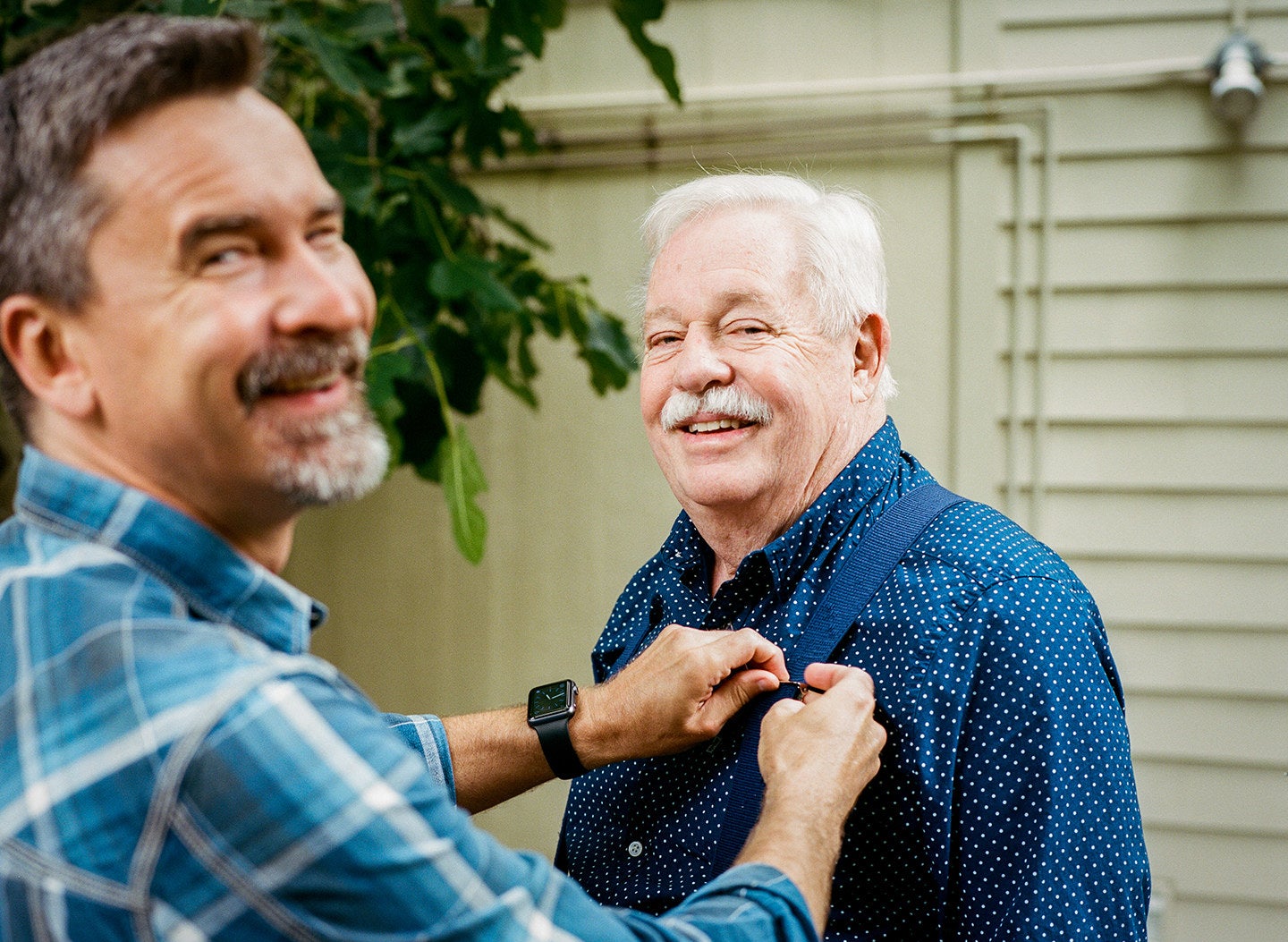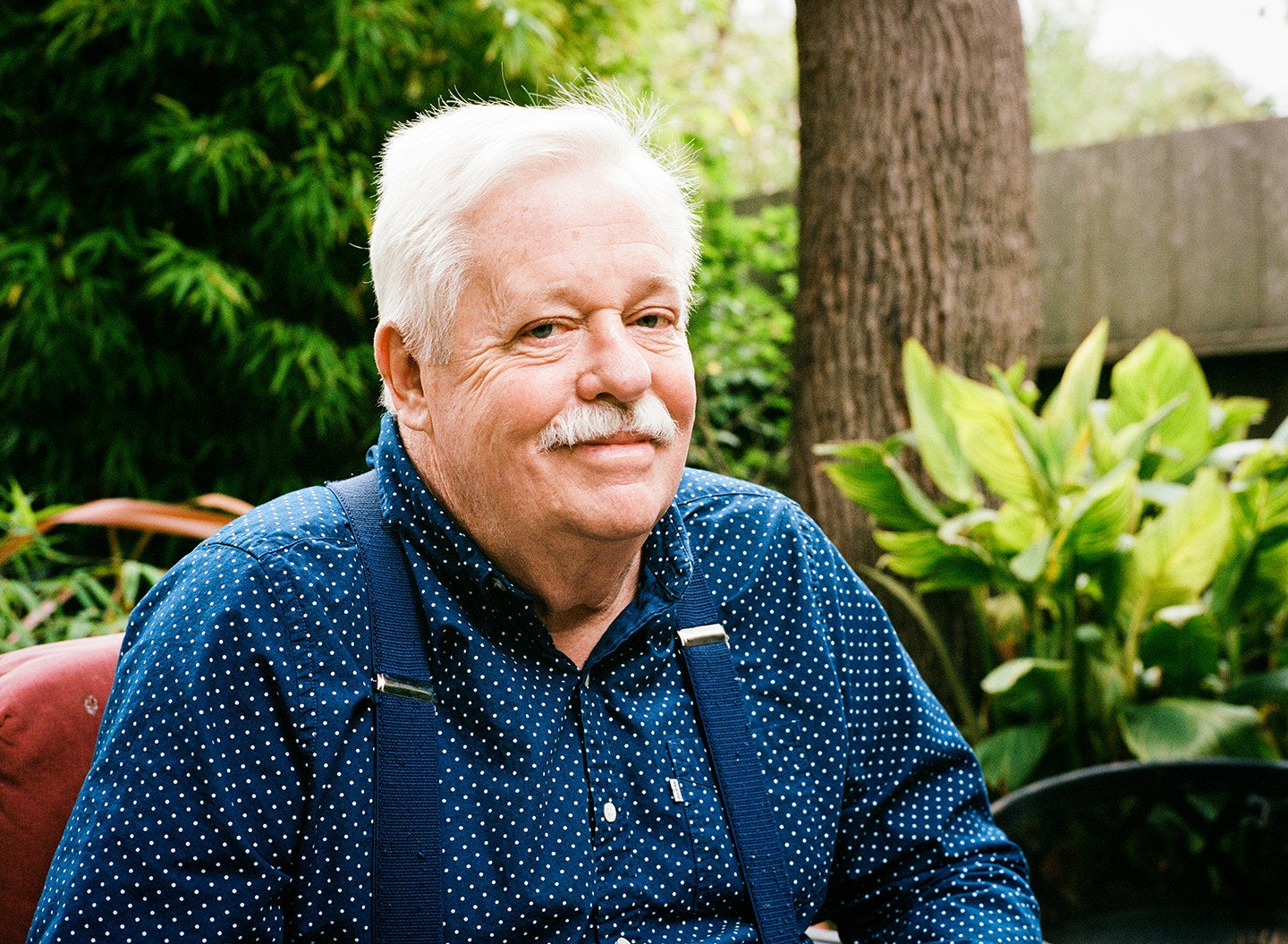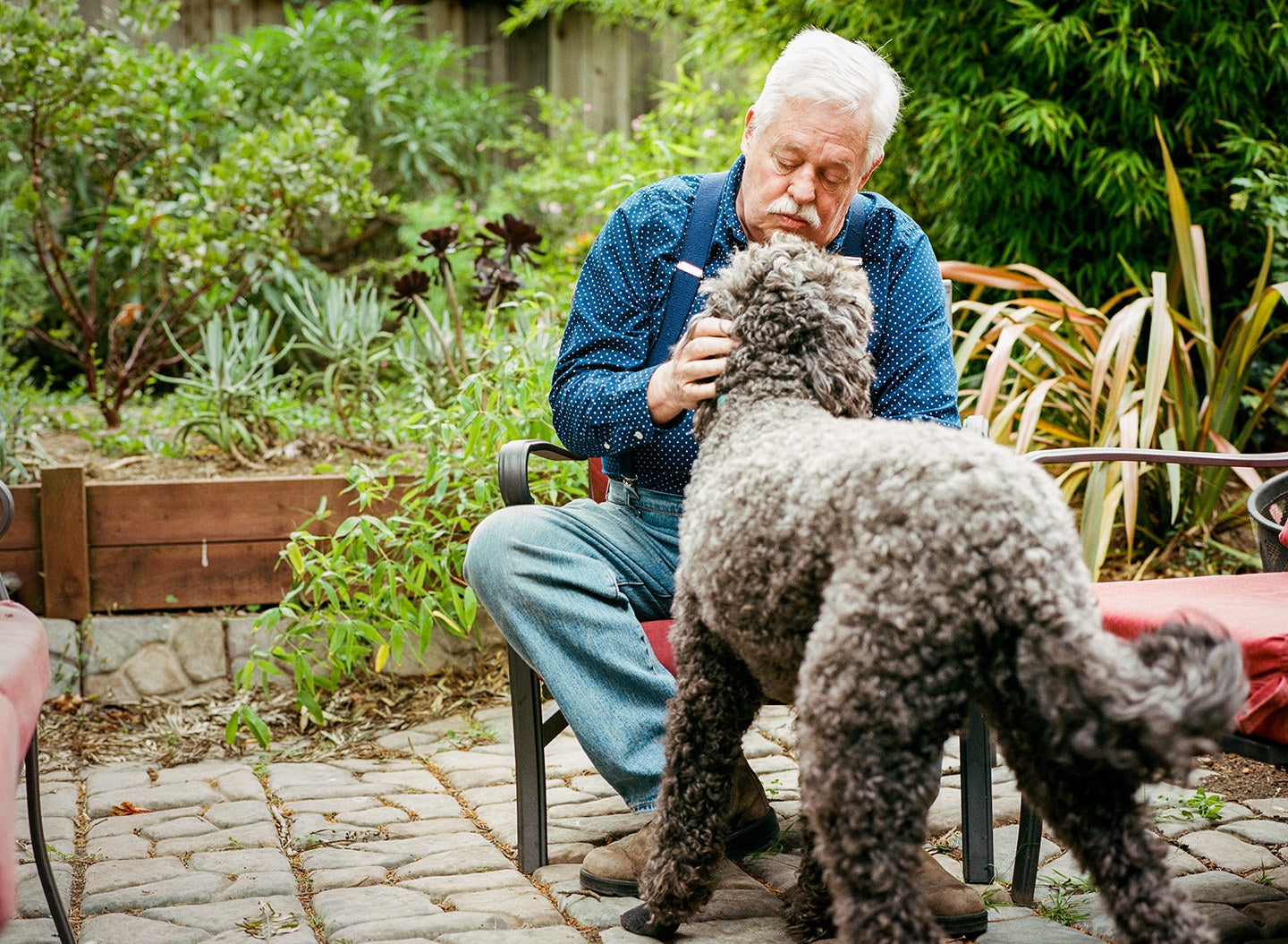“Burst down those closet doors once and for all,” said Harvey Milk, America’s first out gay politician, before he was assassinated in 1978. “And stand up and start to fight.”
Since then, his friend the acclaimed author Armistead Maupin has been fighting and flinging open closet doors with every word he writes.
“The only way we can liberate ourselves is to move into the open air and tell the world who we are,” Maupin tells BuzzFeed News as we sit in his living room in San Francisco. “If anyone is out there waiting for some glorious moment when your Baptist grandmother is going to approve of you, just stop it right now and claim your own life.”
The 73-year-old has just finished doing exactly that. His first memoir, Logical Family, is the final layer in a 40-year process of revealing himself. Before now, Maupin spoke only through his characters – a strategy that worked to outrageous effect.
The nine books that have come to define him, the Tales of the City series, achieved something far beyond their most obvious signs of influence – the millions sold, the numerous television adaptions. They changed the story told about LGBT people.
“We had to like ourselves first before we could really stand up and fight back.”
Through the series' kaleidoscopic cast living in a bohemian boarding house in Russian Hill, San Francisco, a new narrative formed. From 1976 to 2015, readers followed the characters into every corner of their lives – their bedrooms and backrooms, their losses and grief and great towering loves. LGBT people ceased to be literature’s figures of tragedy – doomed outcasts – and instead became figures of triumph: human and vulnerable but courageous, hands held and raised aloft.
Maupin does not look like a revolutionary. As he reclines on a sofa in his cosy garden flat in the Castro area, his watery eyes, white moustache, and cushiony body call to mind a curled-up cat, watchful but content. His husband Chris Turner tends to him, adjusting the author's shirt for the photographer, but Maupin seems unbothered. Why worry about appearances, his distracted expression suggests, when you have a message to deliver?
“My activism was cultural,” he says. “We had to like ourselves first before we could really stand up and fight back. I gave them some people they could like and see themselves in.”
Where Milk used the placard, Maupin used the pen. The coming-out letter his central gay protagonist Michael “Mouse” Tulliver sends his Republican parents in More Tales of the City became a cut-out-and-keep pattern used by countless readers for revealing the truth to loved ones. He supplied the words others found impossible to form.
“I’m proud of the role I played in that,” he says with a faint smile, “in changing the minds of the world.”

Maupin speaks carefully, often slowly, looking around the room at the symbols of his life reflecting back at him: the wooden writing bureau spotlit by a lamp, the stack of manuscripts awaiting his signature, the cartoon-like painting of a man being buggered by a lion. The picture is comical, quasi-erotic, and faintly disturbing.
He laughs, reveals that the actor Russell Tovey was equally struck by it when he saw it recently, and returns to the theme of claiming your life. You have to orchestrate it in so many ways, he explains, as if still immersed in considering his own life story. Writing the memoir was harder than fiction. Sometimes he only managed one page a day. “You have an additional self-consciousness that comes into play: Does your modesty seem false or genuine? Am I telling too much or too little?”
It seems to have given him clarity, if nothing else, that if you do orchestrate your own life, rather than allowing others to conduct it, and do so with “joy and honesty”, it will, he says, “attract similar people to you, and you’ll be a much happier person.”
He should know. Raised by a white supremacist father in North Carolina, Maupin spent his early life attempting to please him. He remained in the closet and worked for the anti-gay politician Jessie Helms, later elected as North Carolina’s Republican senator. But after serving in Vietnam, Maupin pitched up in San Francisco to become a journalist – and to become himself.
The misery and shame that had throttled him for 25 years dissipated as he came out, shifting his fervour from right- to left-wing politics. “The longer your journey is, the more radical you end up,” he says before alighting on one pivotal moment.
“I discovered the big lie that had been told to me about sex. That lie being ‘suck a dick, go to hell’. That was so obviously wrong the minute I did it because I was thoroughly in heaven,” he says, laughing. “It was just a huge relief to realise that all this nonsense, all this fear about being this thing, was for nothing.”
“I discovered the big lie that had been told to me about sex. That lie being ‘suck a dick, go to hell’.”
Coming out also heralded profound changes in the young writer. “Everything great in my life happened after I came out and wrote about it. I vowed to tell stories that would promote that idea.”
Tales of the City was born. It began as a fictional column in the San Francisco Chronicle, but such was its popularity that it soon spawned a book and then another and another.
We first meet the characters in 1976: Mary Ann Singleton, falling into San Francisco from the mid-west like a startled meteor; Mouse Tulliver, starved of love’s oxygen after his Floridian upbringing, now gasping for it in every bar, bus, and sauna; Mrs Madrigal the trans landlady, poetry and kaftans fanning out behind her, cloaking the mystery of her past; Brian, the lost, womanising, burnt-out lawyer; and Mona, the “half-arsed lesbian” and secret daughter of Madrigal’s, shouting in patriarchy’s face.
Maupin wrote approximately in real time, following the characters over 40 years, capturing each era as he, and they, lived it. The acid-drenched ’70s, with early emancipation throbbing in discos and bathhouses, sank into the AIDS-savaged ’80s, as those once dancing and fucking now lay dying. After a long break, the characters returned in the internet-obsessed ’00s, now in late middle age, looking somewhat askance at the younger generation.
“I was accused,” he says, “of inventing a utopian place – Barbary Lane – the notion that a straight woman, a straight man, a gay man, a bi woman, and a transgender landlady would all be living under the same roof, but the truth was I was already beginning to see that and feel it.” He was also accused, fairly, of scarcely writing any characters from ethnic minorities.
“I was fresh out of the South – my imagination didn’t stretch beyond the kinds of characters I might have known,” he says. “I was also very cowardly, because I thought I might not be able to create believable African-American characters.”
He thinks for a moment and looks down. “It hurts to have to say, ‘I grew up in a place where there were plenty of black folks but they went nowhere I went' – they weren’t in our churches, our schools, in our social life. It’s embarrassing to admit that you’ve seen so little of life that you end up writing that way.”

Logical Family is full of admissions, as Maupin confronts the racism of his upbringing and his early adoption of a particular strand of Republicanism. At one point, he recalls now, he campaigned as a student for businesses to be able to shun immigrants. “I used the argument I had learned from my father that a proprietor of a business had the right to do what he or she wanted to do with that business,” he says. “It’s all just bullshit.” But in the writing of the book, “I had to remind myself that at 20 I was that person.”
The memoir is also stuffed full of delicious anecdotes, many of which involve public figures. Sharing a joint with a “bereft and empty”-looking Tennessee Williams. Meeting a “sweaty”, “awkward” President Nixon, who described a journalist who had been hostile to him as a “total bitch”. Being driven through Las Vegas by Liberace’s lover: “the tightest, tannest face I had ever seen on someone his age, whatever that was”.
Then there are his longstanding friendships with Christopher Isherwood and Ian McKellen, as well as a whirlpool of sex – cottaging, orgies – replete with unfortunate downsides: crabs, hepatitis. Maupin does not seem overly encumbered by self-consciousness.
Logical Family will be nectar for the geekier element of Tales devotees, as it reveals for the first time the provenance of many of the characters and storylines. Fans have also been thrown further meat with the recent news that Netflix is developing a miniseries based on Mary Ann in Autumn, one of the latter instalments of Tales.
“The story will begin in modern times when the 53-year old Mary Ann returns to San Francisco with a troubling secret,” he says, confirming that the adaptation already has writers attached to it, one of whom is from Orange Is the New Black. “I’m waiting for a lightning bolt to hit me at any moment,” he says.
“If you let lies in in any form you’re going to begin to corrode whatever it is you have.”
This incredulity is born from the fact that it took years for his works to be recognised.
“The literary world didn’t even mention me when it came to queer revolutionary writing,” he says, fiddling with the suspenders on his jeans before finally dispensing with them. “I didn’t get the attention, because I was the serialist.” He was also perennially compared to Charles Dickens purely on the basis of form, which rather misses the point of both writers.
Just as Dickens chronicled the grotesque face of Victorian poverty, Maupin evoked the burgeoning liberation of a shackled minority. They are both, above all, social commentators who shifted attitudes, and in the process risked the venom of traditionalists.
“I became famous by telling the truth,” says Maupin. He also paid handsomely for it. After waiting years for literary recognition, when television beckoned, it was booby-trapped. In 1993, when PBS and Channel 4 in Britain aired the first adaption of Tales, starring Laura Linney, it featured every cloud of dope smoke, bathhouse steam, and gay sex sweat rising from the book. Horrified, the American Family Association protested. PBS caved, pulling out of the second season.
“It was the beginning of the modern culture wars,” he says, as if suddenly seeing his life set against history. “Tales was something they used to fan the flames of that.”
But Maupin persisted, hell-bent on telling America, and the wider world, the truth about LGBT people, and by extension, people generally. His work in its entirety reads above all as an allergic reaction to lies – an instinct that stretches right back into his childhood.
“In my family, the truth is avoided at all costs,” he says as Chris, his logical rather than biological family, calls out “goodbye”, leaving us alone. “Pain arrives out of dishonesty. As with the closet, you’re only imprisoning yourself. If you let lies in in any form you’re going to begin to corrode whatever it is you have.”
This theme is played out in a horribly illuminating detail in Logical Family. His former lover Rock Hudson, the closeted Hollywood movie star, who died of AIDS, had, Maupin writes, “a deep groove on one of his thumbnails – a deformity really – that made me curious enough to ask about it one day. ‘Just an old war wound,’ he said.” But it wasn’t.
Maupin writes that he saw one day that, “Rock was digging that groove with his own forefinger, incessantly gouging away at the nail in a quiet act of self-flagellation. He had spent decades being someone he was not – an illusion that was successful outside of the gay grapevine – but that mangled thumb betrayed the pain of his repression.”
The inner worlds of LGBT people remain central to Maupin’s work. He talks about even the young people working in the tech industry in San Francisco who still in 2017 struggle with coming out – a subject that “has been my theme for a very long time”, he says. “It’s the only thing, the main thing. Harvey Milk would be saying that himself today if he hadn’t been murdered.”

Maupin has lost famous friends, he says, because he pressed them on coming out and in reaction they severed the relationship rather than the lie. On at least one occasion, Maupin’s persuasion worked, however, by encouraging Ian McKellen to announce in 1988 he was gay. Shortly after, the actor cofounded Stonewall, which became Britain’s largest LGBT rights organisations.
By contrast, Maupin begins to talk about another internationally famous actor, widely known to be in the closet. “I can’t quote any of that,” I tell him.
“Why can’t you? What did I say?” he says, his face consumed by an impish smirk as he talks about a compromising photo he has seen of the star. His playfulness and accompanying laughter erupt often and suddenly, almost explosively, like the naughty twin bursting out of the serious campaigner.
Harvey Milk was equally mischievous. “Funny and boisterous and very sexually charged,” says Maupin. “His death made it clearer than ever that you’re extremely vulnerable if you’re a visible gay activist.”
On one occasion a few years ago, Maupin rode in an open-top car at San Francisco Pride – just as Milk had done in the '70s – with Laura Linney.
“I’m not talking to members of my family who voted for Trump.”
“It occurred to me that any one nutjob in a neighbouring building can pick you off in a convertible,” he says. He has never had death threats, however, unlike Milk.
“I’ve had threats of Jesus,” he says, snorting. “I’ve had people tell me how disappointed Jesus was. But imaginary figures can’t kill you, so I’ve never been bothered by it.”
Logical Family bursts down more than closet doors: Crosses, racists, bigots, and even Trump-supporting relatives are lampooned.
“I’m not talking to members of my family who voted for him,” he says. “It’s over. And in the South it’s all tied in with anti-gay stuff.” Like his family, he says, the South conceals the truth – the ultimate sin for Maupin – “pretending to have accepted the civil rights movement while trashing African-Americans in private.”
There are tender, moving depictions of his family in the memoir, however. His parents came to visit in November 1978, trekking across the country to see their son on the West Coast. While they were there, Milk was shot dead. That night, vast crowds formed in a candlelight vigil for the community’s leader.
Maupin had said goodbye to his parents to attend the march with his friends. As mourners wept and Joan Baez sang, one of Maupin’s friends nudged him, pointing across the street. “I looked again and saw my parents in the midst of all that heartbroken humanity,” he writes. “They had not taken a cab to their hotel after all but followed the river of light to its destination.”
To see some in his own community, 40 years on, now vote for Trump, after all the progress made for LGBT people, is unbearable for Maupin.
“I have nothing but contempt for anyone who makes an argument for that guy,” he says. “We have a president who is rapidly dismantling the rights of trans people, insulting them to their face for having served their country. I don’t think he believes in anything except himself.”
He begins to talk about rampant individualism, and how it’s expressed on social media, often among young LGBT people. “Some of which I wish people didn’t choose to show,” he says, laughing as if addressing certain culprits: “Girl, stop with that, I’ve seen that ass five times too many now.”

But, he admits, he understands the need for affirmation, especially when starved of it growing up.
“I always wanted to be famous,” he says. “There’s a confession.” He considers this need for a moment, and why other gay people might feel it too. “You think it’s going to protect you from the criticism of the world,” he says – as if “fame will make me like myself more.” But it did little to protect Maupin from his father.
“At one point he said, only half-jokingly, ‘Well, if you have to be a faggot, at least you’re a famous faggot.’”
Maupin grins, almost grimaces at this – long-dead, his father can still sting him. “Living well is the best revenge,” he says, looking out the window to the street parallel to Castro.
He says he enjoys the fame he has amassed, which, even living here with the inevitable onslaught of gay fans approaching him in the street, is at a manageable level. And if members of the public overstep boundaries, Chris steps in, he says.
In keeping with his commitment to honesty, he begins to talk about the more intimate elements of their life together.
“I always wanted to be famous. There’s a confession. You think it’s going to protect you from the criticism of the world.”
“My sex life is better than it’s ever been at 73,” he says. “I don’t know what new plateau we’ve broken through to, but it’s pretty great when someone loves you and you’re able to ask for things.”
They have an open relationship, he says. The way he describes it, however, “ajar” rather than “open” would perhaps be a more accurate description. Rather than going off separately, “we’re more likely to be a three-way, and Chris and I will have discussions about the guy: ‘How do we know him? Is he a fan?’ We sometimes wonder about that.”
He talks today and in the book about a value they share, that fidelity can be distinct from monogamy. Sex, therefore, with another, is not a transgression – but emotional infidelity would be. As such, Maupin is interested in taking PrEP, the medication regime that prevents HIV. “I’ve been meaning to get on it,” he says, adding that it represents a powerful opportunity for the community.
“I think it would be a lovely thing for people not to be frightened of HIV. I don’t think we can argue that we have to have some threat of HIV around just to keep us all being good little boys. There’s a puritanical streak in that argument.”
He says this having survived the AIDS crisis in San Francisco, having lost friends and lovers, and having written literature’s first character to die of AIDS. As with being gay, the subject entwines through his life and his work, the former refracting into the latter, ensuring the truth rings out.
Maupin reflects again on the 40 years he spent writing Tales, the stories that brought thousands to live in his city – “Half the people on my street said they moved here because of me!” – and inspired countless more to be themselves.
“It’s intensely thrilling to see how personal the books become for people,” he says. But no more personal, of course, than they were for him, the Southern, newly-out young man trying to find a way to write and live.
“It was comfortable to hide behind fiction,” he says, his North Carolina accent still singing in the background. “Because you can be a little more honest.”
This echoes something from earlier about being in the closet, that being in hiding – silent and invisible – forces gay people to observe others more keenly. “We become spies,” he says, quietly, as if projecting himself right back to the scared boy he once was. “For our self-protection.” ●
